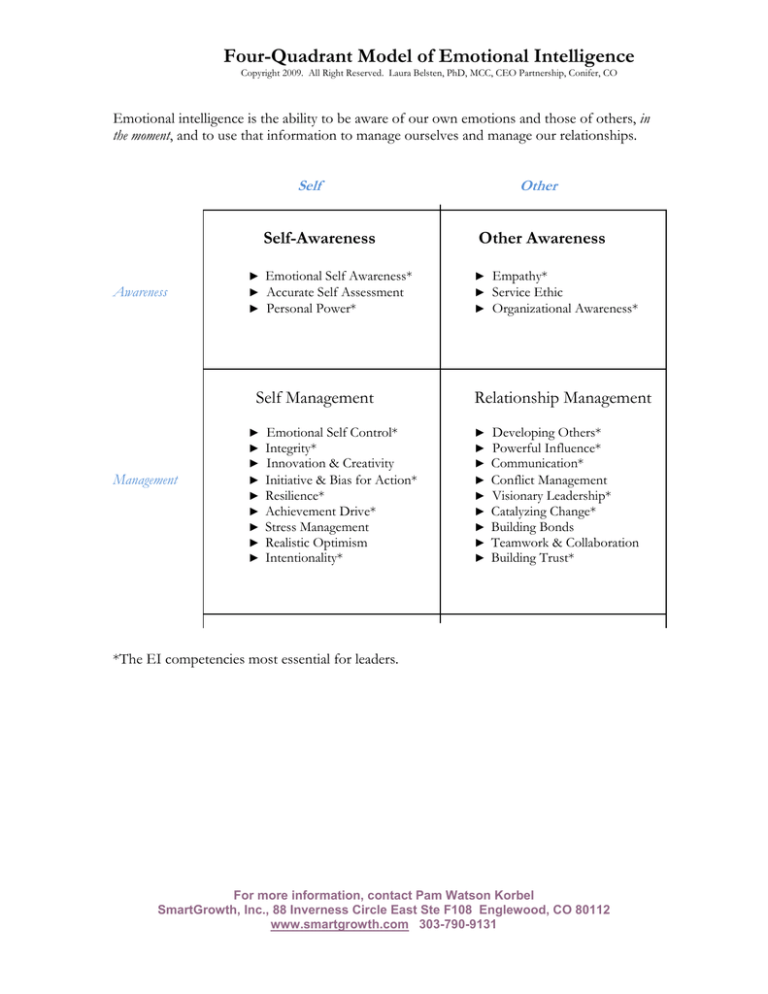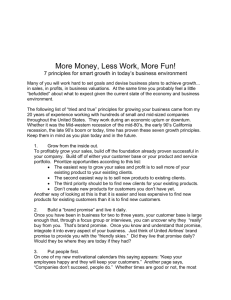
Four-Quadrant Model of Emotional Intelligence
Copyright 2009. All Right Reserved. Laura Belsten, PhD, MCC, CEO Partnership, Conifer, CO
Emotional intelligence is the ability to be aware of our own emotions and those of others, in
the moment, and to use that information to manage ourselves and manage our relationships.
Self
Self-Awareness
Awareness
►
►
►
Emotional Self Awareness*
Accurate Self Assessment
Personal Power*
Self Management
Management
►
►
►
►
►
►
►
►
►
Emotional Self Control*
Integrity*
Innovation & Creativity
Initiative & Bias for Action*
Resilience*
Achievement Drive*
Stress Management
Realistic Optimism
Intentionality*
Other
Other Awareness
►
►
►
Empathy*
Service Ethic
Organizational Awareness*
Relationship Management
►
►
►
►
►
►
►
►
►
Developing Others*
Powerful Influence*
Communication*
Conflict Management
Visionary Leadership*
Catalyzing Change*
Building Bonds
Teamwork & Collaboration
Building Trust*
*The EI competencies most essential for leaders.
For more information, contact Pam Watson Korbel
SmartGrowth, Inc., 88 Inverness Circle East Ste F108 Englewood, CO 80112
www.smartgrowth.com 303-790-9131
Four-Quadrant Model of Emotional Intelligence
Personal Competence
These competencies determine how we manage ourselves
•
Self-Awareness
Knowing one's internal states, preferences, resources, and intuitions
o Emotional awareness: Recognizing one's emotions and their effects
o Accurate self-assessment: Knowing one's strengths and limits
o Personal power: A strong sense of one's self-worth and capabilities; self confidence
•
Self-Management
Managing ones' internal states, impulses, and resources
o Emotional self-control: Keeping disruptive emotions in check
o Integrity: Maintaining high standards of honesty and ethics at all times
o Innovation & creativity: Actively pursuing new approaches and ideas
o Initiative & bias for action: Readiness to act on opportunities
o Resilience: Perseverance and diligence in the face of setbacks
o Achievement drive: Striving to meet a standard of excellence
o Stress management: Working calmly under stress and pressure
o Realistic optimism: Expecting success; seeing setbacks as manageable; persisting in
achieving goals despite obstacles and setbacks.
o Intentionality: Thinking and acting “on purpose” and deliberately.
Social Competence
These competencies determine how we handle relationships
•
Social Awareness
Awareness of others feelings, needs, and concerns
o Empathy: Sensing others' feelings and perspectives, and taking an active interest in
their concerns
o Organizational awareness: Reading a group's emotional currents and power
relationships
o Service ethic: Anticipating, recognizing, and meeting customers' needs
•
Social Skills
Adeptness at inducing desirable responses in others
o Developing others: Identifying others' development needs and bolstering their abilities
o Influence: Wielding effective tactics for persuasion
o Communication: Listening attentively and fostering open dialogue
o Conflict management: Negotiating and resolving disagreements
o Visionary leadership: Inspiring, guiding and mobilizing individuals and groups;
articulating a clear, compelling and motivating vision for the future
o Catalyzing change: Initiating, managing and leading change
o Building Bonds: Nurturing and maintaining relationships, cultivating a wide network;
connecting with others on a deeper rather than superficial level.
o Teamwork & Collaboration: Working with others toward shared goals. Creating
group synergy in pursuit of collective goals.
o Building Trust: Being trustworthy and ethical when working and relating to others;
ability to establish a bond of trust with others.
For more information, contact Pam Watson Korbel
SmartGrowth, Inc., 88 Inverness Circle East Ste F108 Englewood, CO 80112
www.smartgrowth.com 303-790-9131


